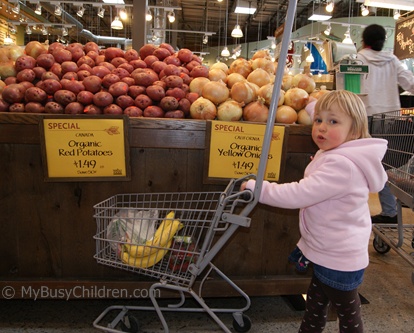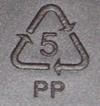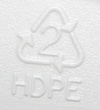How to buy chemicals-free food at the grocery store
| March 30, 2010 | Filled under How-To Articles, Real Food |
Every shopping trip for me is a quest to find healthy food. You may find me in the store reading size 6 font Ingredient list and trying to decipher that recycling code on the bottom of the milk container.
You will never find me in the canned food aisle though. I am boycotting BPA. I am also rarely in the processed foods section, the chemicals galore. 
In the perfect world, I would buy meat, dairy, produce, and honey from local farmers. I might even grow some vegetables myself. I would buy grains (preferably, whole), flour (preferably, whole wheat), sugar, bread, and spices (without MSG) in a grocery store. Well, the world is not perfect. And I am still looking for the local farms.
To make my life a little easier I put together a checklist. It is not a perfect list, it is just our shopping guidelines. The best way, of course, is not to buy anything processed. I am getting there.
Here are my guidelines:
1. Buy organic produce. I am also trying to save money, therefore, I buy organic only fruit and vegetables which have high pesticide residues when grown conventionally (The “Dirty Dozen“):
– Peach
– Apple
– Bell Pepper
– Celery
– Nectarine
– Strawberries
– Cherries
– Kale
– Lettuce
– Grapes (imported)
– Carrot
– Pear
Source: Food News
Not sure if it is organic? Take a look at the round sticker on each individual vegetable:
If the number on the sticker starts with
9 – it is organic
3 or 4 – it is conventional
8 – it is genetically modified
2. Do not buy anything in cans, no matter what the ingredients are. BPA content in cans is dangerous, especially for kids.
UPDATE: Eden uses BPA free cans for their beans. Their tomato cans still contain BPA, though.
3. Buy antibiotics and hormone free meat and dairy. As for milk, I make sure it is also Not Ultra Pasteurized.
4. Do not buy food packaged in containers mark ed with a Recycle c
ed with a Recycle c odes 3, 6, and 7. Plastic Containers labeled with the Recycle code 7 can contain BPA, but not always do. For example, even though Gerber baby food is packaged in number 7 plastic containers, it does not have BPA. Another example is Dole Fruit cups – they have no BPA either. I actually asked them about it since I could not find this information online. They responded that none of Dole’s plastic containers or plastic packaging contain BPA. I still buy food packaged in Plastics 2 and 5, which are considered to be safe.
odes 3, 6, and 7. Plastic Containers labeled with the Recycle code 7 can contain BPA, but not always do. For example, even though Gerber baby food is packaged in number 7 plastic containers, it does not have BPA. Another example is Dole Fruit cups – they have no BPA either. I actually asked them about it since I could not find this information online. They responded that none of Dole’s plastic containers or plastic packaging contain BPA. I still buy food packaged in Plastics 2 and 5, which are considered to be safe.
UPDATE: Good News: Del Monte and Dole do not package their fruit in Plastic # 7 anymore, only #5!
Make sure to avoid Plastic # 6, polystyrene. Styrene is a possible endocrine distrupter/carcinogen. Amazingly, Stonyfield uses plastic # 6 for their 6 Pack Baby Yogurts. Therefore, stick to Stonyfield yougurt containers which are 5.3 oz and larger (these are Plastics 2 and 5, which are ok). Check out this article on The Daily Green for more details.
5. Avoid products with corn syrup, hydrogenated oils, preservatives, artificial colorings and flavors. Here is the break down of these:
5.1 Artificial sweeteners:
- aspartame
- corn syrup
- high-fructose corn syrup
- sorbitol
- Sucralose (which is Splenda) – there is even a book written about its dangers.
- It is a good idea to avoid sugar altogether. Have you seen this article on sugar (Is Sugar Toxic?)
5.2. Trans fats:
- partially hydrogenated vegetable oil
- mono- and diglycerides. This is also a source of trans fats. This is a new way food manufacturers found to slip trans fats into their products without labeling them.
- hydrogenated vegetable oil
5.3 Artificial flavors and colors (we try to avoid all of them, so I don’t have a list).
5.4. Preservatives and food additives:
- TBHQ
- BHA, BHT
- sodium nitrate, sodium nitrite,
- sodium bisulfite, sodium caseinate
- benzoic acid, sodium benzoate
- MSG, hydrolyzed vegetable protein
- sulfites, sulfur dioxide
- lactitol, maltitol, mannitol
- carrageenan ( I wrote about carrageenan here)
What about you? What do you look for when you buy groceries?